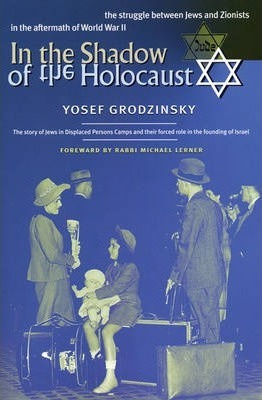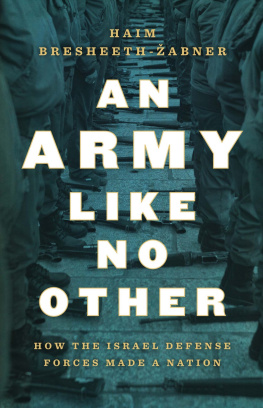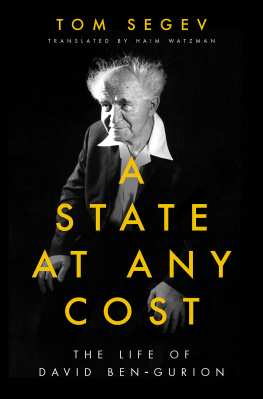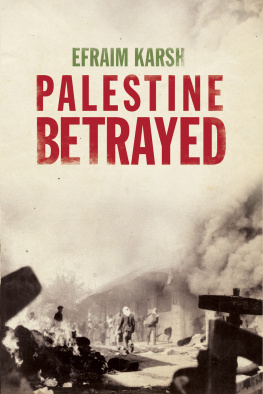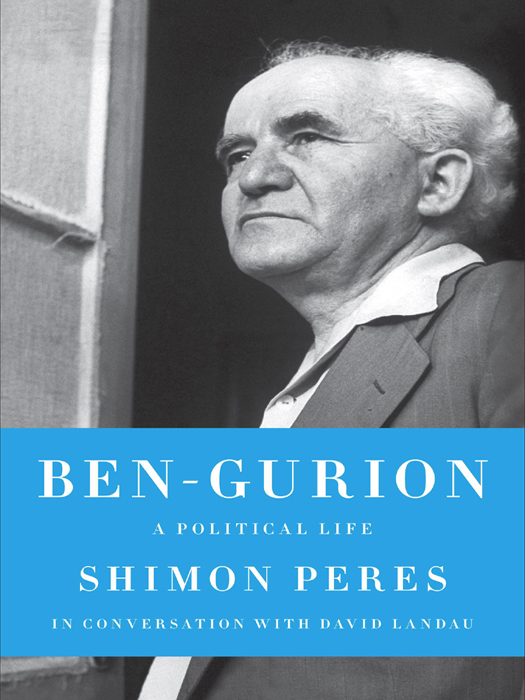JEWS AND POWER Ruth R. Wisse
THE EICHMANN TRIAL Deborah E. Lipstadt
FORTHCOMING

THE WORLDS OF SHOLOM ALEICHEM Jeremy Dauber
ABRAHAM Alan M. Dershowitz
MOSES Stephen J. Dubner
BIROBIJAN Masha Gessen
JUDAH MACCABEE Jeffrey Goldberg
THE DAIRY RESTAURANT Ben Katchor
JOB Rabbi Harold S. Kushner
ABRAHAM CAHAN Seth Lipsky
SHOW OF SHOWS David Margolick
MRS. FREUD Daphne Merkin
WHEN GENERAL GRANT EXPELLED THE JEWS Jonathan D. Sarna
MESSIANISM Leon Wieseltier
Copyright 2011 by David Landau
All rights reserved. Published in the United States by Schocken Books, a division of Random House, Inc., New York, and in Canada by Random House of Canada Limited, Toronto.
Schocken Books and colophon are registered trademarks of Random House, Inc.
Library of Congress Cataloging-in-Publication Data
Peres, Shimon, [date]
Ben-Gurion : a political life / Shimon Peres, in conversation with David Landau.
p. cm.
eISBN: 978-0-307-90689-2
1. Ben-Gurion, David, 18861973. 2. Prime ministersIsraelBiography. 3. ZionistsPalestineBiography. 4. IsraelPolitics and government19481967.
I. Landau, David, [date] II. Title.
DS 125.3. B 37 P 47 2011 956.94052092dc23 [ B ] 2011021044
www.schocken.com
Jacket image: David Ben-Gurion,
December 31, 1948, by John Phillips/
Time Life Pictures & Getty Images
Jacket design by Darren Haggar
v3.1
CONTENTS

A NOTE TO THE READER

As much as the laws of the Talmud, the creation of the State of Israel was the result of argument and debate and compromise. Ben-Gurion not only argued with his ideological opponents on the right and the left, he also argued with members of his own partyand sometimes even with himself. This book, orally produced but hammered through collaboration into written shape, is itself a fusion of memory and history and multiple competing narratives. How else but through dialoguewith myself, with the past, and with my collaborator who, as a lifelong journalist and former editor of Haaretz, has his own burning questions for me about Ben-Gurion and his legacycan a book like this be written? I would even hope that in some sense this book is a dialogue with the future, which will need to choose what of Ben-Gurions legacy it elects to follow.
In that spirit of dialogue, and even of argument, there are a few places within this book where the questions of David Landau and the answers of Shimon Peres need to stand on their own.
INTRODUCTION
Voyage of Destiny
D avid Ben-Gurion was a mythic figure, the founding father of Israel and a modern-day prophet, but he was also a real man who stormed through history on human legs. It was my great privilege to know him and work with him for many years. This book is not a memoir of my time with Ben-Gurion, but it is inevitably shaped by my time with him. Since his death in 1973, I have thought a great deal about the sort of leader he was: visionary and pragmatic, steeped in Jewish history and yet forward looking and unsentimental. He is our Washington and our Jefferson, and yet in some sense our Lincoln too, for the War of Independence in 1948 brought with it a danger of civil war. He seems to me now to be an emblem not only of the energy that created the State of Israel but also of the sort of leadership that the country so desperately needs if it is to find its way to peace and security. Not all of his assumptions have been borne out by events. But his historic decision to accept the partition of the Land of Israel in order to secure the State of Israel as a Jewish and a democratic state shines forth today as a beacon of statesmanship and sagacity.
I n order to understand Ben-Gurion, it is necessary to return to the shtetl in Poland where he was born and which stamped him deeply with Jewish feeling, Jewish history, and Zionist fervor. But the place to begin this book is with a boat ride I took from Palestine to Basel in 1946 to attend the first Zionist Congress after the Holocaust. Moshe Dayan and I were among the delegates from the political party in Eretz Yisrael, though we were much younger than all the others. I represented our youth movement, Hanoar Haoved.
We set out from Haifa on a Polish ship. I found myself sharing a cabin with Mapai veterans Levi Eshkol and Pinhas Lavon. They were old hands at this sort of seafaring, and they insisted that we draw lots for the best bunk, the one right under the porthole. As bad luck would have it, I won. I immediately offered the bunk-with-a-view to Eshkol. He kindly but firmly refused. No, he said. You won it fair and square. Its yours. I was all of twenty-three years old and until recently had been used to sleeping on a camp bed in a tent in our fledgling kibbutz, Alumot. When our first child, Zviya, was born a few months earlier, my wife and I graduated to a hut with solid walls. Eshkol, then fifty-one, was a senior and respected official in the Mapai-dominated Yishuv, the pre-state Jewish community in Palestine. At the time of our voyage, he also served as secretary-general of the powerful Tel Aviv Labor Council and as a ranking officer in the Haganah, the Yishuvs clandestine defense force. Ben-Gurion regarded him as a trusted lieutenant.
I was still weakly remonstrating when Lavon chimed in, Well, if Eshkol wont take it, then, um, I suppose Lavon was forty-two. As a young man in Polish Galicia, he had founded the pioneering Zionist youth movement Gordonia. He had served as co-secretary-general of Mapai and was widely seen as one of the partys brightest hopes. Eshkol turned on him with all his bass-voiced vehemence. What kind of Gordonian values were these? What kind of socialist was he if he blithely proposed to rob me of what was mine by right? And on and on. I listened, silent and aghast, to these luminaries of our movement berating each other in the name of our most hallowed principles.




